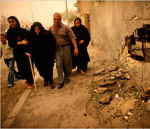 The Times: Iraq’s Shia Muslim parties have formed a parliamentary alliance that will keep the country’s Sunni minority out of power and could spark a new round of sectarian violence.
The Times: Iraq’s Shia Muslim parties have formed a parliamentary alliance that will keep the country’s Sunni minority out of power and could spark a new round of sectarian violence.
The Times
Oliver August
 Iraq’s Shia Muslim parties have formed a parliamentary alliance that will keep the country’s Sunni minority out of power and could spark a new round of sectarian violence.
Iraq’s Shia Muslim parties have formed a parliamentary alliance that will keep the country’s Sunni minority out of power and could spark a new round of sectarian violence.
Two months after landmark elections, the State of Law party of Nouri al-Maliki, the Prime Minister, and the Iraqi National Alliance (INA), which is dominated by Moqtadr al-Sadr, the radical cleric, announced that they would jointly form a new government. The deal was apparently put together with the help of the Iranian Embassy in Baghdad, which maintains close ties with Shia political parties. They expect to have a narrow majority in parliament.
The winner of the election, Ayad Allawi, the former Prime Minister, denounced the new alliance and warned that violence may result. His group won the vote count in the March elections, but it is the largest bloc in parliament that is allowed to try to form a government first. Though a secular Shia himself, Mr Allawi represents the Sunni community.
Iraq remains split along sectarian lines, with the Shias, who were oppressed under the Sunni rule of Saddam Hussein, firmly in charge now. Before the election, and even after it, there were hopes that a cross-sectarian alliance might bridge the divide.
But a successful intervention by the Iranian Government prevented that. Many Shia leaders owe allegiance, and in some cases their positions, to Tehran.
It is not certain that the nameless alliance will hold and be able to elect a government. For a start, it did not announce a prime ministerial candidate.
Mr al-Maliki insists on keeping his job, but parts of the INA despise him. Aware that the alliance may lack credibility, the two partners announced that conflicts would be resolved by senior clerical leaders including Grand Ayatollah Ali al-Sistani.
“The marjaiyah [Shia religious leadership] has the final say in solving all the disputes between the two sides,” the agreement said, referring to the authority based in the holy city of Najaf.
Ayatollah al-Sistani has unrivalled authority in Iraq but keeps out of power politics. Yesterday a spokesman said that he had not agreed to be the alliance’s referee, nor had he been asked. Fears that Iraq is drifting towards theocracy appear, therefore, to be premature, though not unfounded.


